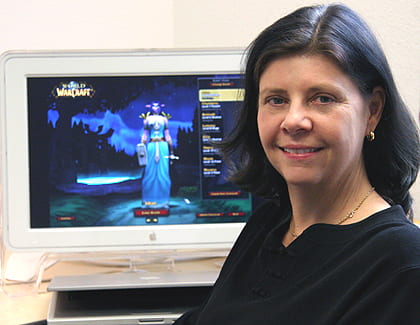Game on
Informatics professor Bonnie Nardi explores the ‘World of Warcraft’

By day, Bonnie Nardi works as informatics professor in the Donald Bren School of Information and Computer Sciences. By night, she morphs into a cape-wearing, tiger-riding priestess with supernatural healing powers. Nardi’s a player in the popular “World of Warcraft” computer game. She’s using her real-life intellectual powers to study “the complex social world on the Internet,” and while she’s a serious scholar of the game, she also spends hours before bed playing just for fun – a development she admits is out of character.
“I usually don’t connect much with pop culture,” Nardi says. “The last game I played was Monopoly.”
She got hooked last year after some of her students mentioned they wanted to study Massively Multiplayer Online Role Playing Games – MMORPGs. Intrigued, she gave “World of Warcraft” a try.
“I didn’t expect to like it, but it’s a beautiful world. It draws you in.”
Suddenly she was tussling with monsters, bartering for goods at the cyber auction house and distributing magic potions. “I was probably the worst player to hit the game,” she says. Before long, however, she’d advanced to the highest level and had a circle of online friends.
“People might be horrified to know they’re playing with a middle-aged woman,” she jokes.
As a researcher interested in computer-mediated communications and society and technology, Nardi became fascinated by how players would “engage in sustained activity” with strangers.
“They would never do that in real life,” she says. “The closest thing we have to it is basketball pick-up games.”
She and co-author Justin Harris, a former graduate student in informatics, recently published a study called “Strangers and Friends: Collaborative Play in World of Warcraft” challenging the notion that the Internet leads to isolation. Through face-to-face interviews with players, they found the Internet breaks down barriers between strangers and encourages collaboration with those outside one’s usual economic and social realm.
They also explored reasons people get attached to the game.
“It gives a tremendous sense of autonomy,” Nardi says. “You can do whatever you want. You can try to get rich, you can duel, or you can heal others. That’s different from school and work, where there are things you have to do.”
Indeed, in a land far from academia, Nardi likes riding her trusted mount through mystical forests, over mountaintops and across vast deserts in a computer-generated place she finds “enchanting.”
“There’s a huge world to explore,” she says.

